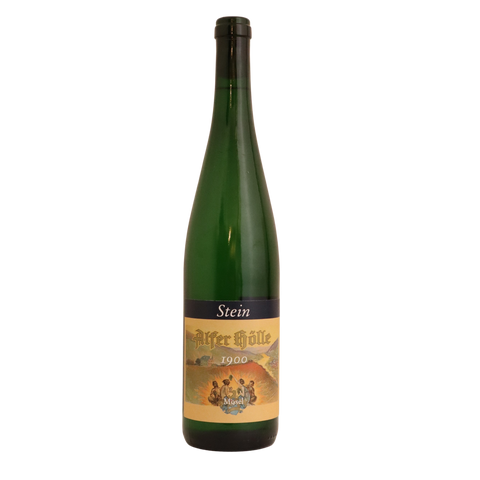
2022 Stein "1900 Alfer Hölle" Riesling, Mosel, Germany
Allow the wine to unfurl (decanting is a good idea, or just give the bottle a few hours to open) and it is one of the most exotic, perfumed wines of the Mosel; explosively aromatic, crushed flowers and slate, ripe, luscious, glycerin-rich stone fruits, layer after layer like a mille-feuille of apricot, quince and slate.
There are 2 units left in stock.
ABOUT THIS WINE
Stein’s “1900” bottling is one of the more extraordinary wines of the Mosel.
Here we have a historic site, the second oldest producing Riesling vineyard in the Mosel with just over 1,000 vines planted in the year 1900 (thus the name of the cuvée). This is a vineyard Ulli Stein tends like a garden. The wine is fermented in neutral barrel and Stein allows it to find its own balance. Thus we have in 2021 a wine that is a Kabinett Trocken (off-dry/semi-sweet), whereas normally this is a Spatlese (properly sweet).
ABOUT THIS PRODUCER
Ulli (and now his young protégé Philip Lardot) farms meaningful parcels of land that have a few important things in common: They are not easy to work. They are commercially unknown and therefore (most likely) barely financially viable. Finally, and most importantly: Ulli has to love them. Stein is more than a winemaker – he is a passionate advocate for the traditional, steep, slate vineyards of the Mosel. In 2010 Ulli published a manifesto warning of the threats to the region’s 2000-year-old viticultural tradition. It’s perhaps difficult to speak of an overarching “style” at Stein; or maybe it’s that the word, the concept, just doesn’t feel right. Winemaking with Ulli is refreshingly light on “style,” on some idea projected into the vineyards, and more about what the vineyards say to him. Certainly, there is a focus on wines that are dry; lightness and zip are more important than gobs of fruit. Complexity is good, but not at the expense of the whole – better to be simple and well done than overdone and, well, a mess. Cut is more important than size. One last note of importance, due to his belief in the importance of old vines the family never grafted to phylloxera-resistant rootstock in the 70s when this practice was the norm. So Ulli now has a profound collection of ungrafted vines, farming around 10% of the ungrafted vines in all of Germany.
